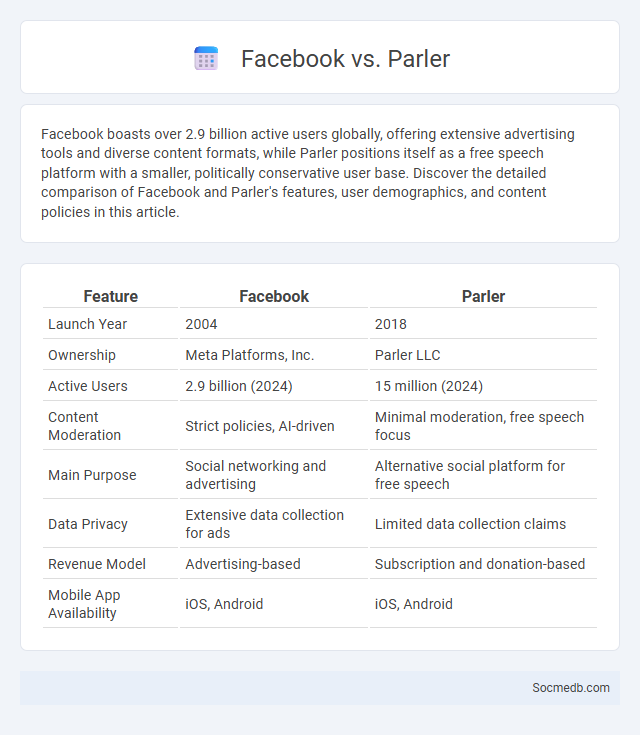
Photo illustration: Facebook vs Parler
Facebook boasts over 2.9 billion active users globally, offering extensive advertising tools and diverse content formats, while Parler positions itself as a free speech platform with a smaller, politically conservative user base. Discover the detailed comparison of Facebook and Parler's features, user demographics, and content policies in this article.
Table of Comparison
| Feature | Parler | |
|---|---|---|
| Launch Year | 2004 | 2018 |
| Ownership | Meta Platforms, Inc. | Parler LLC |
| Active Users | 2.9 billion (2024) | 15 million (2024) |
| Content Moderation | Strict policies, AI-driven | Minimal moderation, free speech focus |
| Main Purpose | Social networking and advertising | Alternative social platform for free speech |
| Data Privacy | Extensive data collection for ads | Limited data collection claims |
| Revenue Model | Advertising-based | Subscription and donation-based |
| Mobile App Availability | iOS, Android | iOS, Android |
Understanding the Rise of Facebook and Parler
Facebook revolutionized social media by creating a user-friendly platform that emphasized real-life connections, extensive networking features, and personalized content algorithms, leading to its global dominance with over 2.9 billion monthly active users. Parler, rising as an alternative social network, capitalized on users seeking less content moderation and more free speech, attracting a niche audience interested in open discourse and political expression. Your insights into these platforms reveal how divergent user needs and platform policies drive social media evolution and user engagement trends.
Defining Fake News in the Social Media Era
Fake news in the social media era refers to deliberately fabricated or misleading information designed to deceive users and manipulate public opinion. Social media platforms amplify the spread of such content through algorithms prioritizing engagement over accuracy, resulting in widespread misinformation. Recognizing fake news requires critical evaluation of sources, cross-referencing facts, and understanding the impact of viral content on digital communication ecosystems.
How Facebook Handles Misinformation
Facebook employs a combination of AI-driven algorithms and human fact-checkers to identify and reduce the spread of misinformation across its platform. The company partners with third-party fact-checking organizations accredited by the International Fact-Checking Network to review and label false or misleading content. Facebook prioritizes reducing the distribution of flagged content in News Feed algorithms and provides users with context from reputable sources to increase awareness and promote informed engagement.
Parler’s Approach to Content Moderation
Parler's approach to content moderation emphasizes minimal censorship, prioritizing free speech while allowing users greater control over their experience. The platform employs a community-driven moderation model combined with AI tools to detect harmful content without extensive interference. Your interactions on Parler are shaped by this balance between open expression and maintaining a safe environment.
Key Policy Differences: Facebook vs Parler
Facebook enforces comprehensive content moderation policies with AI-driven removal of hate speech, misinformation, and harmful content, adhering to community standards designed for global compliance. Parler prioritizes minimal content moderation, emphasizing free speech principles and allowing broader expression except for illegal content, which results in fewer content takedowns and more user autonomy. These key policy differences highlight Facebook's focus on platform safety and misinformation control versus Parler's commitment to unrestricted user discourse within legal limits.
User Demographics and Community Behavior
Social media platforms attract diverse user demographics, with younger generations like Gen Z and Millennials dominating usage across Instagram, TikTok, and Snapchat, while older adults tend to prefer Facebook. Community behavior on these platforms reveals patterns of engagement, such as sharing, commenting, and liking, heavily influenced by algorithms that prioritize personalized content feeds. Data indicates that active participation rates are higher in niche interest groups and online communities, fostering stronger social connections and brand loyalty within targeted audiences.
Viral Spread of Fake News on Both Platforms
Fake news rapidly gains traction on social media platforms like Facebook and Twitter due to algorithm-driven echo chambers that amplify sensational content. The viral spread is fueled by user shares, comments, and likes, which increase visibility across diverse networks in minutes. Efforts to combat misinformation involve AI fact-checking tools, user warnings, and content moderation policies aimed at reducing the presence and impact of false information.
Political Implications and Echo Chambers
Social media platforms significantly shape political discourse by amplifying selective information that often reinforces existing beliefs, creating powerful echo chambers. These environments limit exposure to diverse perspectives, intensifying political polarization and affecting voting behavior. Your awareness of echo chambers can help mitigate biased information consumption and promote a more balanced understanding of political issues.
Legal and Ethical Challenges in Curbing Fake News
Legal frameworks grapple with defining jurisdiction and enforcing regulations across global digital platforms, complicating efforts to combat fake news effectively. Ethical challenges emerge in balancing freedom of speech with the responsibility to prevent misinformation that can harm public trust and safety. Social media companies face increasing pressure to develop transparent content moderation policies and implement advanced algorithms to identify and mitigate disinformation without infringing on user rights.
The Future of Social Media and Information Authenticity
The future of social media hinges on enhancing information authenticity through advanced AI-powered verification tools and blockchain technology to combat misinformation and fake news. Platforms will increasingly integrate real-time fact-checking algorithms that analyze content credibility, ensuring Your newsfeeds are trustworthy and transparent. Emerging trends also emphasize user empowerment, granting individuals greater control over data privacy and content curation to foster a more genuine online environment.
 socmedb.com
socmedb.com